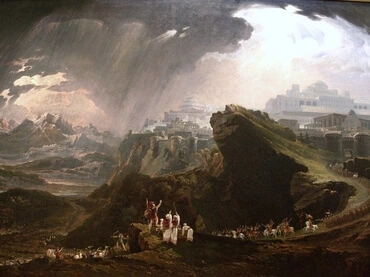1
Or la parte toccata a sorte alla tribù dei figliuoli di Giuda secondo le loro famiglie, si estendeva sino al confine di Edom, al deserto di Tsin verso sud, all’estremità meridionale di Canaan.
2
Il loro confine meridionale partiva dall’estremità del mar Salato, dalla lingua che volge a sud,
3
e si prolungava al sud della salita d’Akrabbim, passava per Tsin, poi saliva al sud di Kades-Barnea, passava da Hetsron, saliva verso Addar e si volgeva verso Karkaa;
4
passava quindi da Atsmon e continuava fino al torrente d’Egitto, per far capo al mare. Questo sarà, disse Giosuè, il vostro confine meridionale.
5
Il confine orientale era il mar Salato, sino alla foce del Giordano. Il confine settentrionale partiva dal braccio di mare ov’è la foce del Giordano;
6
di là saliva verso Beth-Hogla, passava al nord di Beth-Araba, saliva fino al sasso di Bohan figliuolo di Ruben;
7
poi, partendo dalla valle di Acor, saliva a Debir e si dirigeva verso il nord dal lato di Ghilgal, che è dirimpetto alla salita di Adummim, a sud del torrente; poi passava presso le acque di En-Scemesh, e faceva capo a En-Roghel.
8
Di là il confine saliva per la valle di Ben-Hinnom fino al versante meridionale del monte de’ Gebusei che è Gerusalemme, poi s’elevava fino al sommo del monte ch’è dirimpetto alla valle di Hinnom a occidente, e all’estremità della valle dei Refaim, al nord.
9
Dal sommo del monte, il confine si estendeva fino alla sorgente delle acque di Neftoah, continuava verso le città del monte Efron, e si prolungava fino a Baala, che è Kiriath-Iearim.
10
Da Baala volgeva poi a occidente verso la montagna di Seir, passava per il versante settentrionale del monte Iearim, che è Kesalon, scendeva a Beth-Scemesh e passava per Timna.
11
Di là il confine continuava verso il lato settentrionale di Escron, si estendeva verso Scikron, passava per il monte Baala, si prolungava fino a Iabneel, e facea capo al mare.
12
Il confine occidentale era il mar grande. Tali furono da tutti i lati i confini dei figliuoli di Giuda secondo le loro famiglie.
13
A Caleb, figliuolo di Gefunne, Giosuè dette una parte in mezzo ai figliuoli di Giuda, come l’Eterno gli avea comandato, cioè: la città di Arba padre di Anak, la quale è Hebron.
14
E Caleb ne cacciò i tre figliuoli di Anak, Sceshai, Ahiman e Talmai, discendenti di Anak.
15
Di là salì contro gli abitanti di Debir, che prima si chiamava Kiriath-Sefer.
16
E Caleb disse: "A chi batterà Kiriath-Sefer e la prenderà io darò in moglie Acsa mia figliuola".
17
Allora Otniel, figliuolo di Kenaz, fratello di Caleb la prese, e Caleb gli diede in moglie Acsa sua figliuola.
18
E quando ella venne a star con lui, persuase Otniel a chiedere un campo a Caleb, suo padre. Essa scese di sull’asino, e Caleb le disse: "Che vuoi?"
19
E quella rispose: "Fammi un dono; giacché tu m’hai stabilita in una terra arida, dammi anche delle sorgenti d’acqua". Ed egli le donò le sorgenti superiori e le sorgenti sottostanti.
20
Questa è l’eredità della tribù dei figliuoli di Giuda, secondo le loro famiglie:
21
Le città poste all’estremità della tribù dei figliuoli di Giuda, verso il confine di Edom, dal lato di mezzogiorno, erano:
22
Kabtseel, Eder, Jagur, Kina, Dimona, Adeada,
24
Zif, Telem, Bealoth,
25
Hatsor-Hadatta, Kerioth-Hetsron, che è Hatsor,
26
Amam, Scema, Molada,
27
Hatsar-Gadda, Heshmon, Beth-Palet,
28
Hatsar-Shual, Beer-Sceba, Biziotia, Baala, Tim, Atsen,
29
Eltolad, Kesil, Horma,
30
Tsiklag, Madmanna,
31
Sansanna,
32
Lebaoth, Scilhim, Ain, Rimmon; in tutto ventinove città e i loro villaggi.
33
Nella regione bassa: Eshtaol, Tsorea, Ashna,
34
Zanoah, En-Gannim, Tappuah, Enam,
35
Iarmuth, Adullam, Soco, Azeka,
36
Shaaraim, Aditaim, Ghedera e Ghederotaim: quattordici città e i loro villaggi;
37
Tsenan, Hadasha, Migdal-Gad,
38
Dilean, Mitspe, Iokteel,
39
Lakis, Botskath, Eglon,
40
Cabbon, Lahmas, Kitlish,
41
Ghederoth, Beth-Dagon, Naama e Makkeda: sedici città e i loro villaggi;
42
Libna, Ether, Ashan,
43
Iftah, Ashna, Netsib,
44
Keila, Aczib e Maresha: nove città e i loro villaggi;
45
Ekron, le città del suo territorio e i suoi villaggi;
46
da Ekron e a occidente, tutte le città vicine a Asdod e i loro villaggi;
47
Asdod, le città del suo territorio e i suoi villaggi; Gaza, le città del suo territorio e i suoi villaggi fino al torrente d’Egitto e al mar grande, che serve di confine.
48
Nella contrada montuosa: Shanoir, Iattir, Soco,
49
Danna, Kiriath-Sanna, che è Debir,
50
Anab, Esthemo, Anim,
51
Goscen, Holon e Ghilo: undici città e i loro villaggi;
52
Arab, Duma, Escean,
53
Ianum, Beth-Tappuah, Afeka,
54
Humta, Kiriath-Arba, che è Hebron, e Tsior: nove città e i loro villaggi;
56
Iizreel, Iokdeam, Zanoah,
57
Kain, Ghibea e Timna: dieci città e i loro villaggi;
58
Halhul, Beth-Tsur, Ghedor,
59
Maarath, Beth-Anoth e Eltekon: sei città e i loro villaggi;
60
Kiriath-Baal che è Kiriath-Iearim, e Rabba: due città e i loro villaggi.
61
Nel deserto: Beth-Araba, Middin, Secacah,
62
Nibshan, Ir-Hammelah e Enghedi: sei città e i loro villaggi.
63
Quanto ai Gebusei che abitavano in Gerusalemme, i figliuoli di Giuda non li poteron cacciare; e i Gebusei hanno abitato coi figliuoli di Giuda in Gerusalemme fino al dì d’oggi.







